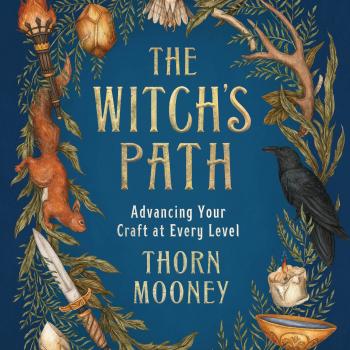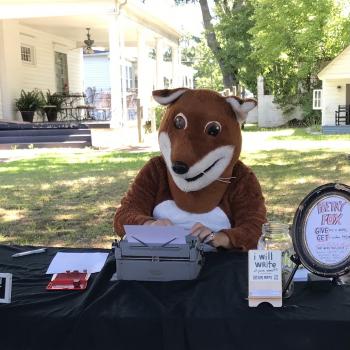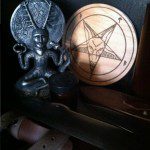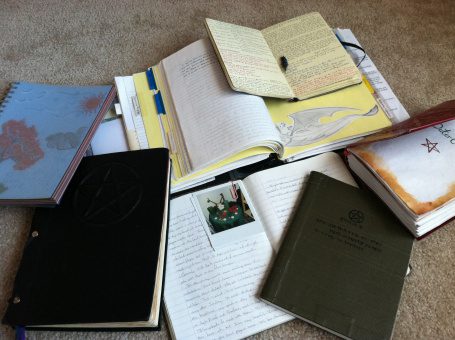
I was taught to keep a journal beginning in the first grade. Every morning, Mrs. West handed out fresh sheets of lined newsprint and we were instructed to write about the day before, how we were feeling, a dream we had, or about something we were looking forward to that week. We were also encouraged to draw pictures to illustrate our entries.
The point was to learn how to write, obviously. My elementary school carried this practice throughout each grade, and by the time I was eight or nine I was compulsive about it. Even when it was no longer mandatory, I journaled almost every day.
My entire life is embarrassingly well-documented and fully illustrated. Yeah, all of it.
Unintentionally (at least, I’m assuming), Mrs. West was also instilling in me what is, I think, my most valuable skill as a priestess and witch: record-keeping.
Witches of all kinds do a lot of talking about record-keeping, whether we’re Wiccans going on about personal books of shadows or Crafters pursuing grimoire traditions. There’s something romantic about gorgeous, old, leather books stuffed with parchment, stained with ink, and containing all those secrets. Magical.
If you’re like most people, the reality is more like this:
You discover witchcraft, you buy a blank book to use as your personal grimoire or book of shadows (the choice was probably a bit agonizing—three-ring binder or handmade book? Leather? Recycled? Should it have sections?), and then you copy Rede of the Wiccae, the Charge, or maybe some tables of correspondences onto the first few pages. It takes you hours, you’re enormously proud, and the only thing personal about this personal witch book is the cover page that you made after a whole night of sifting through Celtic clip art and Googling “illuminated lettering.” Then you put it away and don’t really write in it anymore. Sadness.
Or maybe you never really started one at all. Maybe you bought a really nice leather book and are afraid to actually write in it because you think your handwriting sucks. Or maybe you’re just printing things off from the Internet into a three-ring binder, figuring that you’ll get around to something nicer once you’re further along. Maybe you’re so concerned with “passing on [your] tradition” to your future children that you spend all of your time formulating the details of said tradition instead of actually documenting the things you do or think in the moment (which usually just equates to, again, copying the “the long version” of the Rede and maybe writing something about the goddess you chose for your altar that month). This also usually ends in not writing. More sadness.
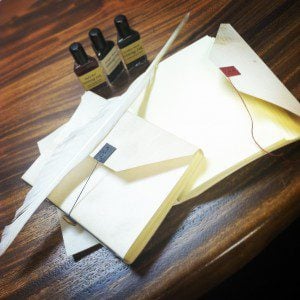
The thing is, keeping a book of your Craft is a skill, and it must be learned and practiced like any other. Disciplined journaling and record-keeping of any kind is an ability that must be actively acquired. It’s not inborn. Most people who discover witchcraft and then rush out and buy that perfect magical journal or notebook find themselves at least a little disappointed when the words don’t immediately flow. And even when the words come, most of the time they belong to someone else. We don’t so much record our own practice as copy that of another, and often without commentary.
There’s not necessarily anything wrong with copying (those of us belonging to traditions with a core of shared material do plenty of it, believe me), but I find that what ends up being valuable down the road is your collected personal experience. Imagine your book as a lab record. What if, instead of keeping notes about experiments and writing down conclusions, chemists just copied the periodic table over and over? Not only would it be boring, but you’d never get anywhere. The periodic table is already on the wall in the lab, just like how Scott Cunningham’s “13 Goals of a Witch” (or whatever) is already on your bookshelf.
Copying can be a good place to start (and it’s an excellent memorization aid), but in twenty years the real value will lie in your process. What were you reading and what did you think about it? What was your first ritual like? What about that time you met that weird guy at the bookstore who said that thing to you? Remember how desperately you wanted to be Sally from Practical Magic? Or that time you accidentally caught your hair on fire trying to do that spell? What about when you made your first Pagan friends? Joined or started that coven? Were initiated? What about the first time the Craft broke your heart and you thought about quitting? How did you get through it all to become who you are now?
Those are the things your downline, your children, your covenmates, and obsessive witchcraft historians want to read.
Not that you have to be writing for anyone else, of course. I know people who burn their books when they’re full. The important thing for aspiring writers is just to write, without being overly critical.
But even if it’s just for yourself, it’s worth recording those personal details that may not strike you as important in the moment. I value my teenaged “book of shadows” beyond words because it reminds me of how excited and happy to explore I was. It also keeps me humble because it shows me my errors, my pretense, my hubris. It reminds me of how hard I’ve worked, even amidst all the mistakes and false starts. (It also reminds me of that time I referred to periods as “the blood of the moon” which is not even the most embarrassing thing I could tell you about right now, believe me).
So write down everything. Disregard your bad handwriting, your lack of style, and your crappy drawing abilities and do it anyway. Choose whatever book, binder, or notebook is available and appealing. You’re going to end up with more than one, anyway (seriously). When a book is full, it always looks amazing, no matter who put it together. More importantly, it’ll be key to understanding what makes you tick, carving out your own practice, and tracking your progress. And who knows. Maybe someday it really will be passed down.






